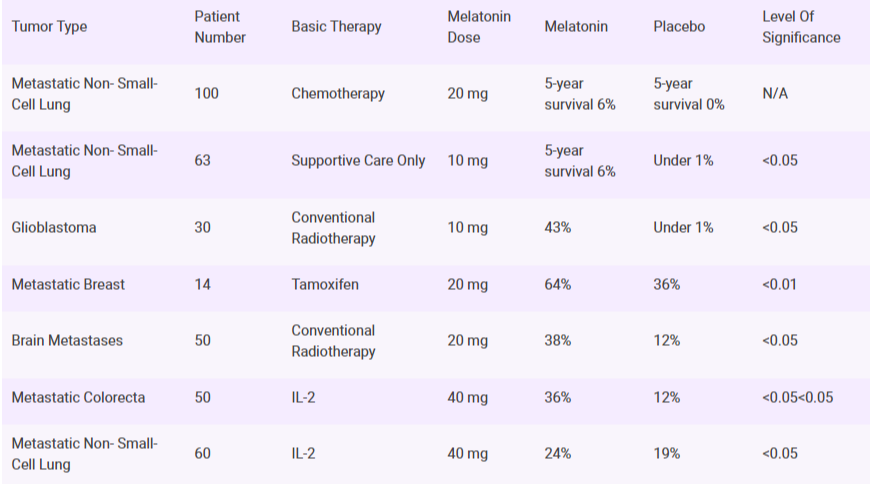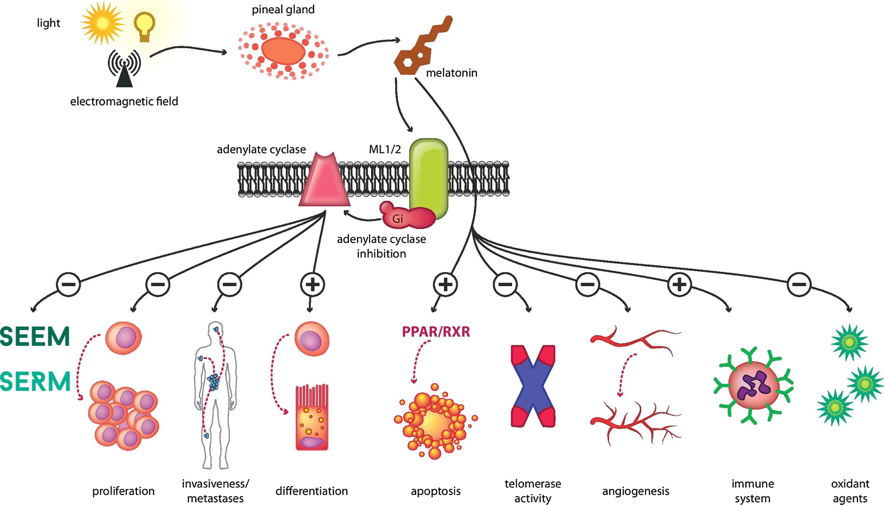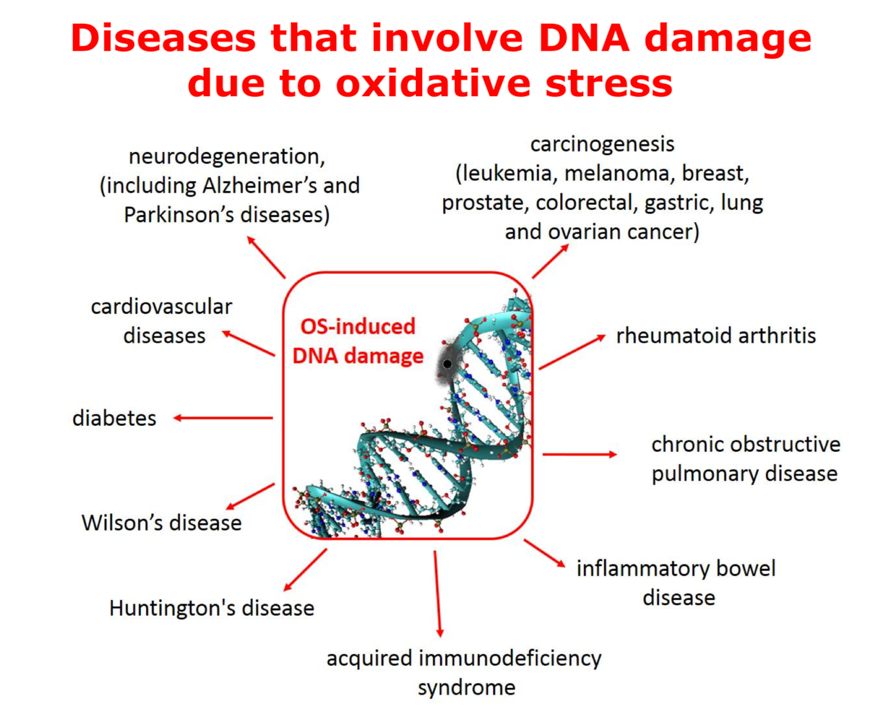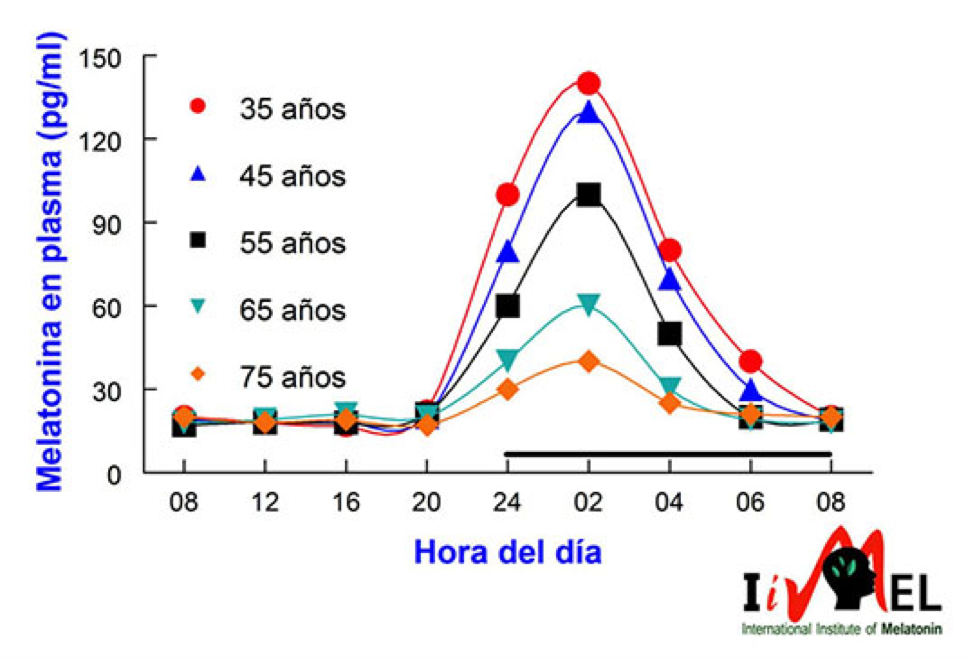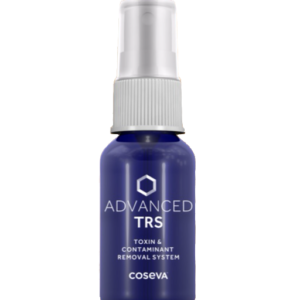High dose melatonin is safe for cancer patients, in study after study it has been shown to reduce side effects of conventional treatments like chemotherapy and radiation while boosting their success rates.
Melatonin is produced in the pineal gland, located deep in the brain and which was considered a possible receptacle for the soul in the early stages of neuroanatomy.
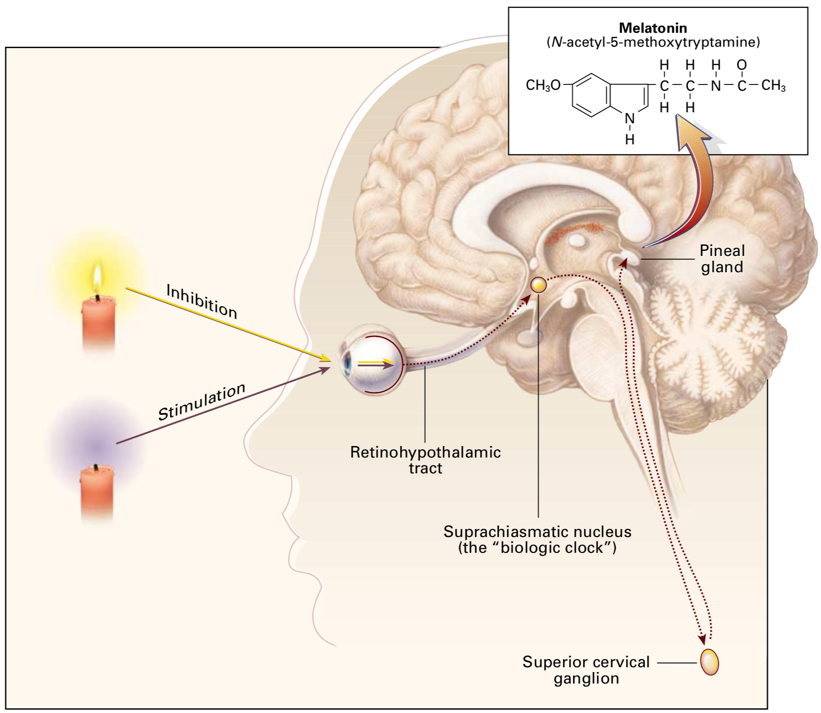
Exposure to blue spectrum light has the greatest effect on the secretion of melatonin.
To secrete melatonin, you do not need to sleep, you only need to be in the dark.
Ultra Melatonin
Professor Ritter went on to say that light at night “is a drug” in relation to the harmful effects it has. This is of extreme importance as the secretion of melatonin and the preparation for an adequate night’s rest begins hours before going to bed (normally at 08:00pm). Maintaining good sleep hygiene and adapting screens to avoid blue light is essential to preserve our melatonin secretion as long as possible.
Melatonin Studies and Cancer
Few people realize melatonin is a cancer-killing hormone that can enhance the human immune system, protect against the toxic side effects of chemotherapy and radiation therapy, and improve wound healing after cancer surgery.
Even fewer are aware of ongoing clinical trials in which melatonin is being used to help cancer patients better manage their disease symptoms, improve their quality of life, and even increase their survival rates.
Ultra Melatonin
A literature search of the PubMed database found 806 publications on “melatonin and cancer.” Fifty-two articles were found concerning clinical studies utilizing melatonin in cancer patients.
Melatonin levels peak during the night but also increase after eating, which partly explains why one may feel sleepy after a meal and why patients with advanced cancer who suffer diminished appetite or tissue wasting have been shown to have reduced levels of melatonin.
Once produced, melatonin remains in the bloodstream only a short time, on average between 20 and 90 minutes.
This is because melatonin is highly fat soluble (lipophilic) and somewhat water soluble (hydrophilic), enabling it to easily penetrate every cellular compartment (membrane, cytoplasm, and nucleus) and, as far as is known, every cell in the body.
Melatonin’s amphiphilicity, or ability to both absorb and repel water—in conjunction with its ability to act as a weak preventive antioxidant, a weak metal ion chelator, and in certain circumstances, a direct free radical scavenger—enables it to counteract oxidative stress within the chaotic tumor microenvironment.
Melatonin can kill directly many different types of human tumor cells.
It is a naturally produced cytotoxin, which can induce tumor cell death (apoptosis). In instances where the tumor has already established itself in the body, melatonin has been shown to inhibit the tumor’s growth rate.
Melatonin Supplementation and Cancer
Melatonin and all its metabolites have a powerful effect by capturing free-radicals; which are highly toxic and damage DNA, leading to degenerative, auto-inflammatory and oncological diseases.
It has been seen in different studies that there is a higher incidence of cancer in workers on night shift, or with alterations in the important hourly rhythms (many transoceanic journeys). In fact, light at night is included as a carcinogen by the World Health Organization.
There is strong scientific evidence that shows that tumors appear, develop and metastasize more easily in subjects exposed to night light that prevents correct melatonin secretion. Melatonin inhibits many of the mechanisms that cancer cells use (Hanahan, 2011) and improves sensitivity to chemotherapy.
In an extensive review published in the journal Critical Reviews in Oncology last year, it was concluded that there is considerable evidence to support the multiple tumor suppressive effects of melatonin, showing a protective effect against chemotherapy and antitumor of melatonin, especially through its anti-gonadotropin and antiestrogenic effect on the breast tumor.
Melatonin exhibits natural oncostatic activity and inhibits cancer cell growth. In patients in whom cancer already has become a noticeable physical burden, melatonin has been shown to alleviate numerous cancer symptoms and to inhibit development of new tumor blood vessels (tumor angiogenesis), which in turn inhibits the cancer from spreading further (metastasis).
Melatonin can retard tumor metabolism and development by lowering the body temperature; it is a natural inducer of hypothermia. Furthermore, as an inducer of antioxidants and itself a weak preventive antioxidant, melatonin hinders tumor cells from participating in free radical damage to normal cells and consequently limits oxidative damage to DNA, lipids, amino acids, and proteins.
Melatonin and Advanced Cancer
In the unfortunate circumstance in which cancer has already overwhelmed the body’s innate cancer-fighting capabilities, including the anti-cancer activity of naturally produced melatonin (levels of which are reduced in most cancer patients), supplemental melatonin may be beneficial. Melatonin plays a critical role in the host defense system against cancer’s progression by activating the cytokine system, which exerts growth-inhibiting properties, and by stimulating the cytotoxic activity of macrophages and monocytes.
Numerous European clinical studies already have examined melatonin’s therapeutic benefits to patients with different types of cancer who either did not respond to standard oncological therapies or were eligible only for supportive care (advanced cancer deemed untreatable by conventional standards).
Administration of supplemental melatonin has been shown to be beneficial even in the supportive care of advanced and end-stage cancer patients: it lessens tissue wasting and diminishes weight loss, fatigue, weakness, and depression; enhances immune function; improves wound healing; and improves quality of life and survival rates.
Furthermore, melatonin improves common symptoms found in both patients with advanced cancer and those undergoing chemotherapy; it counteracts anemia and lymphocytopenia, stimulates platelet production, enhances appetite, and diminishes cancer pain (including bone pain) through its natural analgesic properties. These are substantial benefits considering that approximately half of all patients diagnosed with cancer die because of poor symptom management.
Pharmacological doses of supplemental melatonin can resynchronize individuals shown to have disrupted circadian rhythms, such as night-shift workers. Thus, cancer patients with endogenously depressed melatonin levels may benefit from both meditation and substitutional melatonin therapy, to improve quality of life while potentially inhibiting tumor growth and spread.
Ultra Melatonin
Numerous clinical studies by Lissoni and colleagues have shown that melatonin adjuvant therapy favorably influences the course of advanced cancer, leading to an improved quality of life and increased survival. In cancer patients with untreatable advanced solid tumors, melatonin significantly lowered the frequency of catabolic wasting (cachexia), weakness (asthenia), low platelet (thrombocytopenia), and white blood cell counts (lymphocytopenia) compared to patients who received supportive care only. Melatonin improved disease stabilization and increased survival percentages at one and five years.
Melatonin deficiencies in advanced cancer patients may be due to altered circadian rhythm (disturbed sleep patterns), cancer-related anorexia-cachexia, and reduced food intake as melatonin is produced by the enterochromaffin cells in the gastrointestinal tract in response to feeding.
Melatonin supplementation in turn increases appetite, diminishes tissue wasting,and restores sleep continuity in those with cancer. Administration of melatonin to patients with advanced cancer who have only short expected survival times results in some cases in disease stabilization and improvement of performance status.
— download a study —
Although the evidence demonstrating melatonin’s anti-cancer effects 1 cannot be overstated, melatonin’s impact on cancer treatment remains largely unappreciated. This is likely because pharmaceutical companies have little to gain by advertising the anticancer efficacy of melatonin.
In Europe, where melatonin is not even readily available 😉 (just ask us), many clinical trials of melatonin have been conducted. US pharmaceutical companies, however, have shown little interest in even hosting, let alone funding, such critically important and potentially lifesaving clinical trials.
A study was conducted over 5 years on 212 terminally ill patients with the most common types of cancer for whom the oncologists had given no hope advising palliative symptomatic treatment only (hospice). They were prescribed high doses of melatonin nightly and somehow… “disease control (DC) was achieved in 111/212 (52%) with a regression in 16/212 (8%), and a 1-year and 5-year percentages of survival were achieved in 46% and 11%.”
Study – Five year survival with high dose melatonin and cancer
— download a study —
Further Studies and Conditions involving Melatonin
High concentrations of melatonin have been found in the retina, gastrointestinal tract, bone marrow, skin and other tissues. We can therefore deduce that it may have an influence on other physiological functions through local secretion and that, far from being just a sleeping aid, melatonin has multiple effects throughout the body, including:
-
- Regulating the different biological clocks of the body: biological neural clocks are adjusted in cycles more or less approximate to the duration of the day (22-26 hours), but the other daily cycles of the organism such as hepatic metabolism, renal, oxidative stress, body temperature and muscle toning have less accurate clocks so they require internal synchronization. That is why when we suffer jetlag, we’re not only tired, but we feel almost sick – our body does not work properly.
Control of oxidative stress: melatonin plays a key role in promoting the excellent health of mitochondria and an adequate - control of oxidative stress.
- Prevention of dementia.
- Maintenance of the optimal neuronal state.
- Melatonin and Diabetes type 2
- Melatonin and skin – moisturizing cream with a 0.5% content of melatonin has been shown to very efficiently reduce the incidence of radiodermitis in women submitted to radiotherapy
- Chemo induced mucositis – administration of 1% melatonin in a specially developed gel that is first used for gargling and then swallowed 3 times a day
- Fibromyalgia – women are treated with doses ranging from 10 to 40 mg every day experience a very significant improvement in less than one month
- Ischemia reperfusion in the liver and brain – (10 mg/ Kg/ bodyweight/ day) was investigated. A significant reduction in the inflammatory and apoptotic parameters was seen indicating a reduction in the size and intensity of the lesion. This opens the possibility of treatment of stroke with around 100 mg of melatonin.
- Heart – improvements in inflammation and oxidative stress in the heart and was able to counteract the age dependent increased production of pro-inflammatory cytokines
- Parkinson disease – doses between 25 mg and 100 mg are able to significantly reduce oxidative stress in the substantia nigra thus blocking neuron death. This treatment needs to be started at the initial steps of the disease since it is not able to reverse the already degenerated neurons.
- Alzheimer disease – those patients with a very initial form of the disease showed a slowing down in the evolution of the disease
- Malignant epilepsy – 2 months of treatment with 100 mg melatonin shows a completely normal electrical activity under treatment.
- Regulating the different biological clocks of the body: biological neural clocks are adjusted in cycles more or less approximate to the duration of the day (22-26 hours), but the other daily cycles of the organism such as hepatic metabolism, renal, oxidative stress, body temperature and muscle toning have less accurate clocks so they require internal synchronization. That is why when we suffer jetlag, we’re not only tired, but we feel almost sick – our body does not work properly.
Ultra Melatonin
Each of us has a particular predisposition for melatonin secretion, the most frequent being the average that begins producing melatonin at around 8:00pm in the evening and peaks about 2:00-3:00am in the morning.
Quite often we find, when studying the secretion profile, a lack of coordination and insufficient secretion.
As we age, melatonin secretion drops in quality, resulting in imbalances of the circadian cycles and quantity thereof
Although the doses normally found in supplements are around 2mg, these doses are too small to reach all tissues and serve the different purposes that melatonin has. In addition, in case of using an incorrect dose we can produce the opposite effect (insomnia or de-regulation), which is why taking melatonin supplements without measuring precisely normally only goes well for some people while others report insomnia and discomfort.
We advocate taking high doses of melatonin (10mg – 60mg) which have the maximum beneficial effects, but at a personalized dose and at a specific time which will be most beneficial (and which will avoid side effects).
There is no such thing as “high doses” of melatonin. Melatonin has been shown to be extremely safe and toxic levels of it have not yet been shown. This does not mean that we can take high doses without conducting a previous study, as even if we do not have to avoid the toxicity, we still need to pay attention to the balance of the system.
Summary
Due to its low toxicity even in high doses and the full range of benefits that it seems to have shown, melatonin can be considered as a complementary therapy to usual chemo and radiotherapy and in prevention of breast cancer in women with a history of risk or mammary fibrocystic disease.
So then, beyond the benefits for quality of sleep, melatonin is a true anti-aging molecule, while allowing vital systems to continue optimum functioning and delaying the appearance of diseases.
Ultra Melatonin
*** references ***
1. https://neolifeclinic.com/blog/melatonin-at-high-doses-protects-against-cancer/?lang=en
2. https://www.lifeextension.com/magazine/2004/1/report_melatonin
3. https://www.antiaging-systems.com/articles/405-the-therapeutic-effects-of-high-dose-melatonin-administration
4. earthclinic.com/ailments/melatonin-for-covid19-post-intensive-care/ Covid Vs Melatonin
